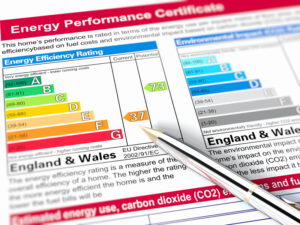Energy Performance Certificates (EPCs) are essential for assessing the energy efficiency of properties, whether they are newly constructed or existing buildings. One of the common questions we hear is: What is the difference between a new build EPC and a standard EPC?
It’s crucial to ensure you obtain the correct EPC to meet Building Control requirements. Producing the appropriate certificate is key to securing approval for your project. Notably, new build EPCs are generated differently compared to standard EPCs.
What is a New Build EPC?

A new build EPC refers to a certificate created by an On-Construction Domestic Energy Assessor (OCDEA) using the Standard Assessment Procedure (SAP) methodology.
The SAP methodology is more comprehensive than the method used for existing properties, making it mandatory for any new dwelling or properties created through conversion or change of use.
These SAP Calculations determine the property’s energy performance based on detailed factors such as:
- Architectural plans and construction materials
- Heating and ventilation systems
- Insulation and glazing
The outcome of these calculations is an EPC that outlines the energy efficiency of the new build. If you’re involved in a new build project or a conversion, understanding these requirements is essential for timely completion and approval from Building Control. For more on SAP calculations and how they apply to your project, explore our SAP Calculations page.
EPCs for Existing Dwellings
Most EPCs, however, are required for existing properties, usually when they are being sold or rented. These certificates provide prospective buyers or tenants with valuable insights into the property’s energy efficiency and potential energy costs.
For existing properties, an accredited Domestic Energy Assessor will visit the home and use the Reduced Data SAP (RDSAP) methodology. This process is less detailed than the SAP calculations required for new builds, as it focuses on visible elements of the building rather than detailed plans.
- This type of EPC is typically required when selling or renting a property
- It’s important to note that EPCs for existing homes are generally less expensive than those for new builds, as they require fewer data points and less complex calculations.
Key Differences Between New Build and Existing Dwelling EPCs
While both EPCs serve the same purpose—to evaluate and communicate the energy efficiency of a building—they differ in the following ways:
- Methodology: New build EPCs use SAP, while existing dwelling EPCs use RDSAP
- Cost: EPCs for existing dwellings are typically more affordable than those for new builds.
- Data Collection: New build EPCs require in-depth details from architectural plans, whereas existing dwellings are evaluated based on a physical inspection.
For more information on how energy efficiency affects your building project or property, visit our Energy Consultancy Services page.
Why Is an EPC Important?

An EPC is a critical document that offers insight into a building’s energy efficiency, environmental impact, and energy costs. Not only is it required for compliance with government regulations, but it also helps property owners and buyers make informed decisions on energy-saving improvements.
If you’re developing a new property, having the right EPC could even help you secure sustainability credentials like BREEAM Certification, which can be beneficial for both developers and tenants.
If you’re working on a new build, renovation, or preparing to sell or rent your home, it’s important to obtain the correct EPC. We provide both new build EPCs and EPCs for conversion and renovation schemes at competitive rates. Our team can assist you in navigating the process, ensuring compliance, and helping you understand what’s needed for Building Control sign-off.
For further reading, also see our article on EPCs, SAP and BRUKL!
How Can We Help?
Want to discuss your project? Call us at 0330 0553405 or email us at be@buildenergy.co.uk. You can also learn more about our services on our Energy Performance Certificates page.
